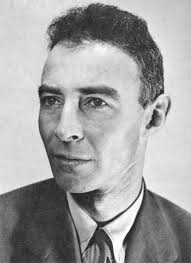J. Robert Oppenheimer [1904-1967] American     
Rank: 11
Physicist, Theoretical Physicist
Julius Robert Oppenheimer was an American theoretical physicist and professor of physics at the University of California, Berkeley. Best, Death, Future, Humor, Knowledge, Marriage, Science, Success, War |  |